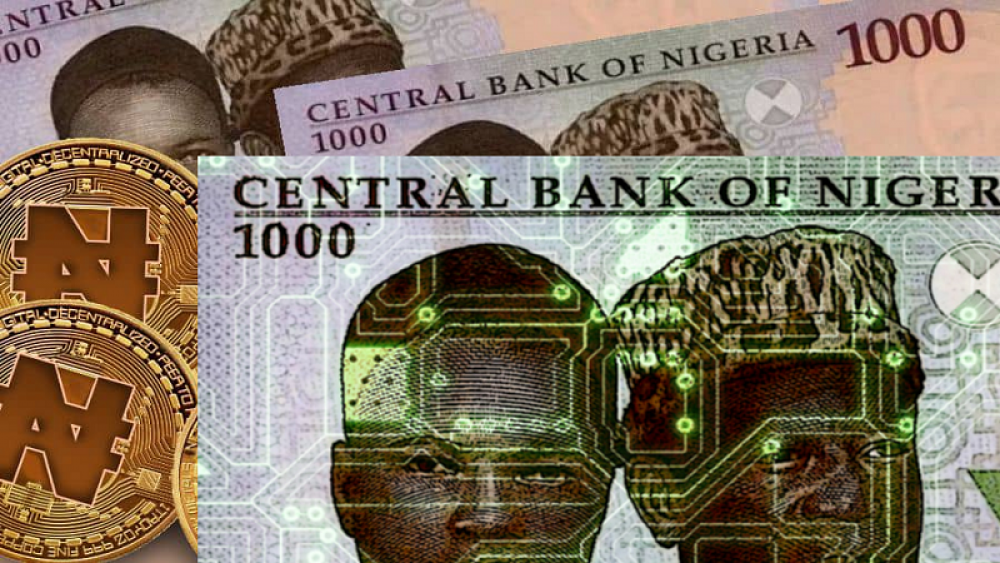Other Pages
- Opinion Poll
- About Us
- Send Your Story
- Contact Us
- Newsletter
- Privacy Policy
- Terms and Conditions

The Central Bank of Nigeria confirmed at the Monetary Policy Committee (MPC) meeting on Tuesday that a digital currency dubbed "eNaira" will be launched by October this year.
Cental Bank Digital Currencies (CBDCs) are a part of the fourth industrial revolution, as countries representing over 90 percent of global GDP are exploring effective ways to adopt this phenomenon, including China which has been heavily cracking down on cryptocurrencies.
The CBN has been researching CBDCs since 2017, and despite giving the cold shoulder to cryptocurrencies earlier this year, has doubled down on its implementation. The live implementation of the CBDC dubbed “e-Naira” will be the result of the research, “Project Giant". According to the Central Bank, the project's main goals are Macroeconomic Management and Growth, Cross-Border Trade Facilitation, Financial Inclusion, Monetary Policy Effectiveness, Improved Payments Efficiency, Revenue and Tax Collection, Remittances Improvement, and Targeted Social Interventions.
In light of this, here are things you should know about Nigeria's CBDC and how it affects you.
Firstly, Central Bank Digital Currencies are going to be normally used as legal money, and also considered the central bank’s direct liability. The CBDC would be divided into two categories: retail and wholesale. A ‘retail’ CBDC would be used as a digital extension of currency by all persons and businesses, whilst a ‘wholesale’ CBDC may only be utilized as a settlement asset in the interbank market by permitted institutions. This means that Retail CBDC will be used in the same manner as banknotes to make retail payments (Peer-to-Peer and Business-to-Person), while Wholesale CBDC will be used to enable transactions between financial institutions, central banks and entities holding accounts with central banks.
In comparison, retail CBDCs are more suited for central banks in developing countries than wholesale as they are focused on reducing the barriers to financial inclusion, but may limit the financial intermediation role currently played by banks. Wholesale, on the other hand, could prevent some of the more disruptive impacts of CBDC on the financial sector but may limit efficiency gains and broad access to CBDC relative to a retail model.
CBDCs differ from cryptocurrencies by design, in that cryptocurrencies are built and operate on a decentralized blockchain, while CBDCs operate on a centralized network. In this case, the CBN will be the main controller. The CBN can reconcile issued CBDC as well as withdraw and issue new CBDC with modernized technical and security attributes.
After the apex bank has assessed and defined its goals for the project, the next step is to design the CBDC. The design entails the technological infrastructure needed to supply and manage the digital currency. After this, the next step is to undertake a feasibility and viability analysis using a proof of concept. Then, the CBN would make moves to educate and inform about the rollout of CDBCs, before finally implementing the eNaira across the country.
After the central bank is done with creation and storage of CBDCs, it would be distributed to financial institutions and licensed service providers who will in turn make them available to individuals and businesses.
Transactions with CBDCs can either be online or offline as individuals will be able to use existing and future payment channels to transfer value.
The introduction of a CBDC has a lot of potential benefits to the economy, government and stakeholders, some of which are highlighted below:
The CBDC has the potential to reduce cash handling costs by 5-7%, deepening digital financial inclusion and promote the development of e-commerce.
e-Naira would promote formal cross-border payments for efficiency, convenience and affordability.
e-Naira would create a reliable mechanism to distribute fiscal stimulus to citizens, this is highly vital due to the activities seen during the distribution of COVID-19 palliatives.
The project would reduce tax leakages due to tax evasion and illicit money flows, also, it promotes and supports the implementation of government objectives.
Nigerians would experience a reduction in the overall indirect cost of cash on the broader community and reduce inefficiencies from dealing with physical cash.
It creates Innovation opportunities in the financial system as new business opportunities arise from emerging business models, financial products and services.
A two-tiered model for CBDC will enable Public-Private Partnership wherein the CBN designs an e-Naira and distributes it technology-driven through Regulated Financial Institutions.
e-Naira creates an opportunity to unlocks new revenue and growth opportunities thereby generating a sustainable value pool by unlocking new market segments.
0 Comment(s)